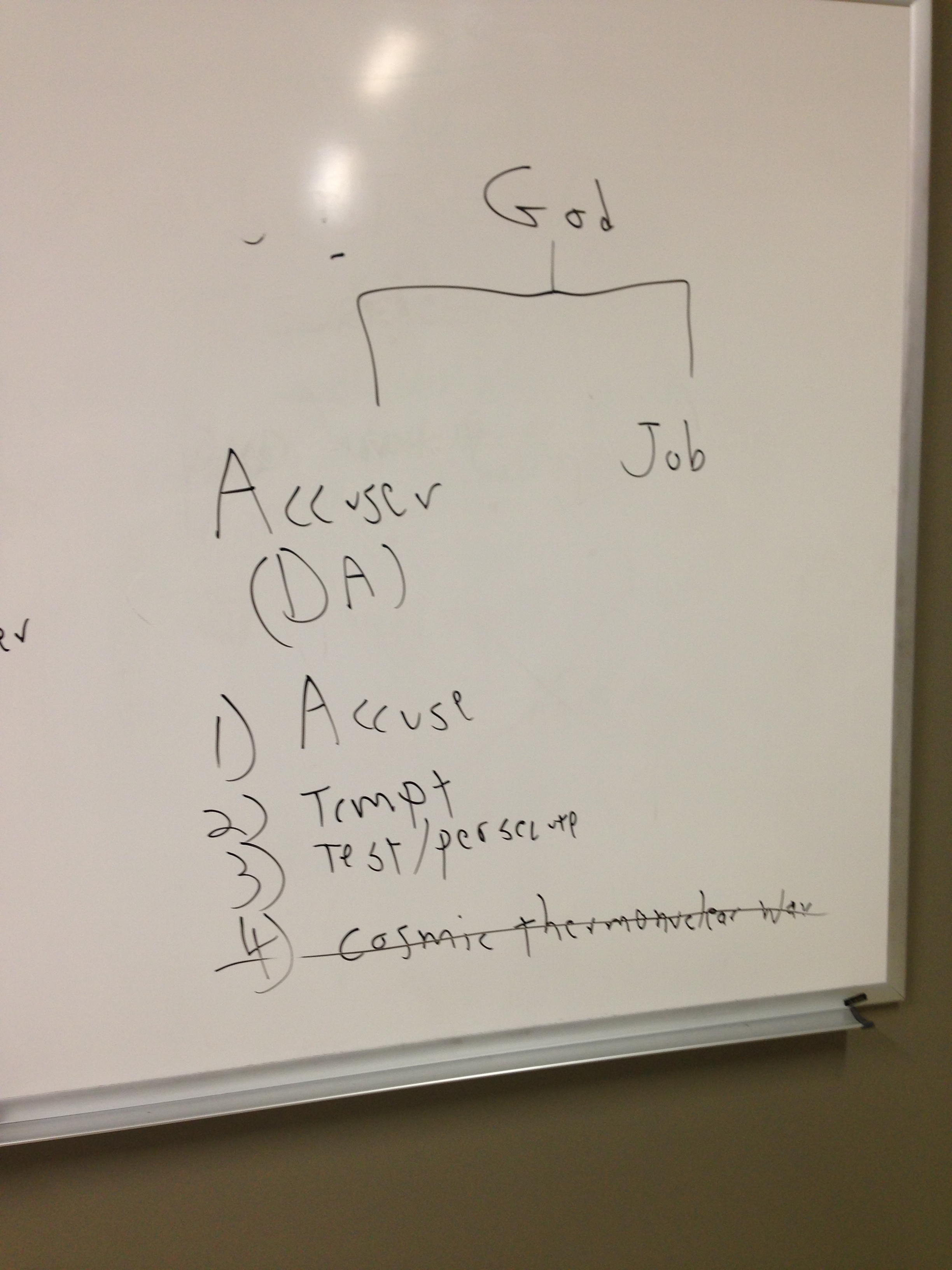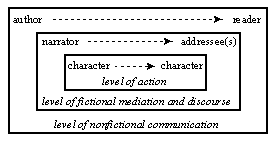 Home Page
Home Page Job
- Lecture.mp3
- Listen in iTunes
- Listen on Stitcher
-
Job is a type of literature called theodicy. A
theodicy is an attempt to respond to the problem of suffering in
a world ruled by an all-powerful, all-good God. The problem is
best stated in the play J.B.(based on the book of Job)
by Archibald MacLeish: "If God is good, he isn't God:
If He's God, he isn't good."
How can an all-powerful God permit evil if he is also all-good?
and vice versa
Mark Twain gives an indictment of the justice of God with his usual clarity:
Our Bible reveals to us the character of our God with minute and remorseless exactness. The portrait is substantially that of a man — if one can imagine a man charged and overcharged with evil impulses far beyond the human limit; a personage whom no one, perhaps, would desire to associate with, now that Nero and Caligula are dead. In the old Testament His acts expose His vindictive, unjust, ungenerous, pitiless and vengeful nature constantly. He is always punishing — punishing trifling misdeeds with thousand-fold severity; punishing innocent children for the misdeeds of their parents; punishing unoffending populations for the misdeeds of their rulers; even descending to wreak bloody vengeance upon harmless calves and lambs and sheep and bullocks, as punishment for inconsequential trespasses committed by their proprietors. it is perhaps the most damnatory biography that exists in print anywhere. It makes Nero an angel of light and leading, by contrast.
As part of its attempt to answer the indictment, the book of Job introduces one of the great
characters of literature -- Satan. Originally, 'Satan' was
not a name but a title. In Job, he is one of the sons of
God, and he's called 'ha-satan' (הַשָּׂטָן), which translates as
'the Accuser.' This is more of a title than a name; it
indicates his job in God's court, which is to accuse people in
legal proceedings. So he is God's district attorney or
attorney general. So in the story, Satan brings charges
against Job, God judges Job, and Job defends himself, not before
the judgment seat of God with an argument, but by undergoing a
trial by ordeal. All the rest of Satan's activities are
designed to better help him make his accusations.
In early texts, God was the sole cause of everything, making
some of his behavior hard to understand. He was the one to
try to kill the world through a flood and the one to save it
through Noah. In the parallel stories about the flood,
some gods would try to destroy the world through flood, other
gods would work to save it. With Satan, we can finally
have that opposition. The cosmic war between good and evil
will come later in Babylon when Judaism adopts it from
Manichaeism.

Jonah
- Lecture.mp3
- Listen in iTunes
- Listen on Stitcher
-
Jonah is a short book, but one that has attracted a great deal
of controversy because of the big fish story in the middle of
it. Unfortunately, debate about the miracle has led people
to miss the point, just as debate over the creation accounts has
led most of us to miss the point of Genesis. And Jonah and
Genesis make almost precisely the same point: we ARE our
brother's keeper. Or in this case, our enemy's. And
the average person will go to almost any lengths to keep from
realizing and applying that message.
The outline of Jonah is simple. While chapters and verses were added centuries after the books of the Bible were written, in this case the chapters accurately reflect the sections of the book.
- Jonah flees God's command and gets caught in a storm.
- Jonah prays in the belly of the beast.
- Jonah preaches, and the Ninevites repent.
- Jonah pouts outside the city.
The outline of Jonah may be simple, but when we look at it from
the perspective of narratology,
it is incredibly complex. Narratology divides stories into
levels (like Rusian nesting dolls) based on the
interactions in and around the text:
The author and the reader interact; the character is limited to interacting with other characters. What makes the three levels so complex in the book of Jonah is that every layer has a Jonah, some of them at war with the other Jonahs, and the book itself is named Jonah:
- Jonah the book
- Jonah the physical author (we assume)
- Jonah the narrator
- Jonah the character
Jonah reflects a debate in Judaism, one that is also in other
religions; our relation to outsiders. The two sides of the
debate are xenophobia vs xenophilia: fear and loathing of the
outsider vs love and acceptance of the outsider. Most
Biblical books are firmly on one side or the other. Joshua
reflect homicidal xenophobia; Judges, Ezra, and Nehemiah are not
far behind, especially with their dire warnings against the
wiles of foreign women. On the other side of the debate is
Ruth, where the foreign woman marries not one, but two Jewish
men (not at the same time!) and becomes the ancestor of both
David and Jesus. In the book Jonah, the character Jonah
represents raging xenophobia that has turned into hatred.
Unlike most xenophobes, Jonah the character recognizes that his
God actually loves the stranger, and he resents that
love. So the conflict in the story is between the hateful
Jonah and the loving God. That conflict is reversed on the
narrative and nonfictional levels, where the loving narrator /
author is confronting the xenophobia of his addressees /
readers. In fact, he still confronts today with out
xenophobia. Most of us tend to be like Jonah, loving our
material possessions (our gourd) more than we love our
neighbors, especially our enemies. And we divert ourselves
from this spiritual insight by getting sidetracked by spectacle
- whales, TV, and smart phones.
So remember, if your main reaction to Jonah is to make you want
to punch a scientist, then you have missed the point, which is
not the whale, but the gourd, and the fact that in this world
the gourd matters less than our brother. That insight is
the beginning of spirituality. Or least one of them.


